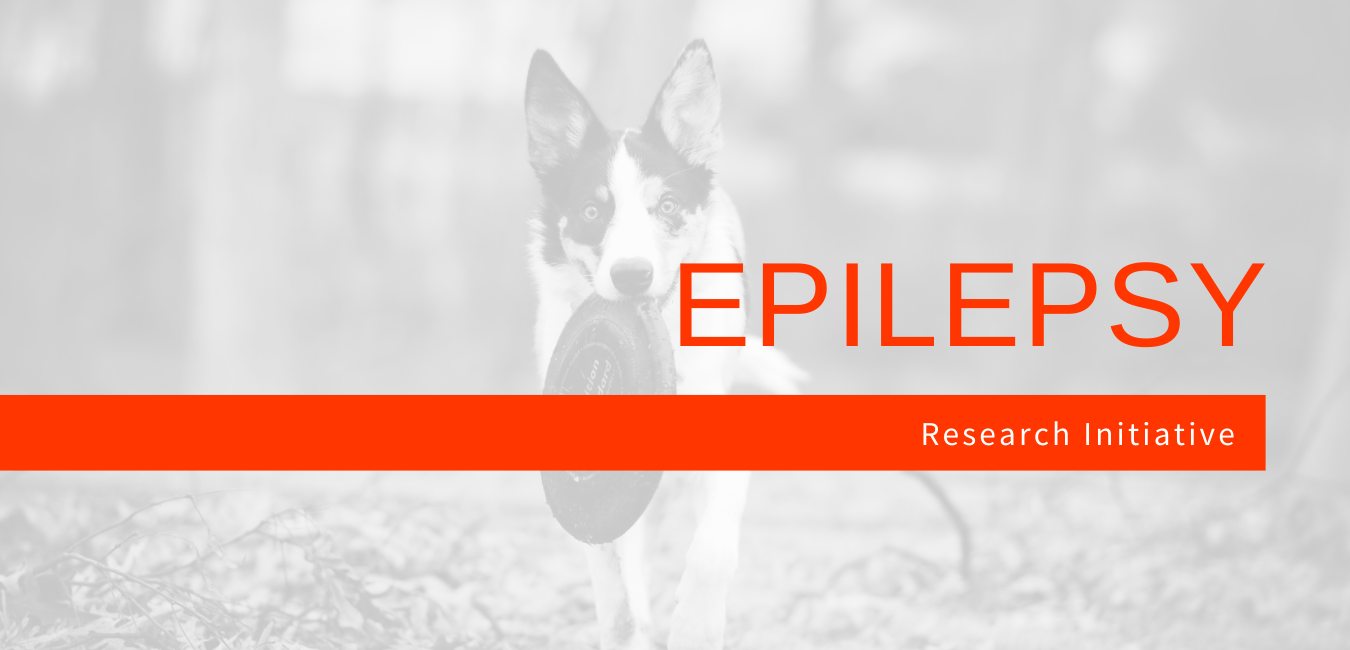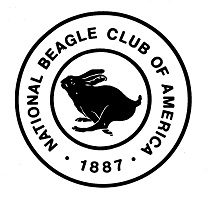
About the Epilepsy Research Initiative
The AKC Canine Health Foundation (CHF) identified the need to better understand epilepsy in dogs with the launch of the Epilepsy Research Initiative. New studies that translated results from the research lab to the veterinary clinic were sought in 2014 in a collaborative response to donors, dog owners and the veterinary community impacted by canine epilepsy. In 2017, an initiative matched-funding challenge furthered CHF’s ability to support innovative research leading to better understanding of epilepsy and more effective treatments. The Epilepsy Research Initiative continues today to equip dog owners and veterinarians with the latest educational resources and further cutting-edge canine health research for this devastating condition.
Epilepsy affects one in every 100 dogs (Heske L, Nodvedt A, Jaderlund KH, Berendt M, Egenvall A. A cohort study of epilepsy among 665,000 insured dogs: incidence, mortality and survival. 2014. Vet J; 202:471-6) and refers to recurrent seizures resulting from an abnormality in brain function. The condition can be inherited (genetic epilepsy), caused by structural problems in the brain (symptomatic epilepsy), or may be of unknown cause (idiopathic epilepsy). Determination of the appropriate treatment for canine epilepsy, as well as prognosis for the condition, depends on accurate diagnosis of the type and cause of seizures.
Since 1995, CHF and its donors have invested more than $2.8 million in 42 grants to study canine epilepsy. Ongoing studies are exploring the use and effects of dietary supplements in the treatment of canine epilepsy, underlying genetics and disease mechanisms, and the role of the gastrointestinal tract and microbiome in the development and treatment of this disease.
$3.0M invested in epilepsy research since 1995.

Learn More about the Initiative
Learn more about the Epilepsy Research Initiative by AKCtv's Ask the Expert: Epilepsy and Tick-borne Disease with former CHF CEO, Dr. Diane Brown.
View moreWhy Study It?
- Epilepsy is the most common medical neurological disorder in dogs
- Despite the development of new anti-epileptic drugs, many dogs' seizures remain uncontrolled using currently available therapies
- Knowledge gained may also improve our understanding of human epilepsy
- Understanding the mechanisms of anti-epileptic drug resistance may lead to more successful seizure management
- New treatment strategies may help dogs whose disease is uncontrolled by currently available therapies and those who cannot tolerate the side effects of current anti-epileptic drugs
- Identification of genetic risk factors may enable breeders to select against such factors and help owners of affected dogs make lifestyle and treatment decisions that improve their dog’s quality of life
Our Progress So Far
Current CHF-Funded Studies
The AKC Canine Health Foundation (CHF) believes in the advancement of science to meet the unmet medical needs of the dogs that are such an important part of our daily lives. Here we list the important active studies in this research program area.
| 03255-MOU | Clinical Characteristics and Heritability of Idiopathic Epilepsy in the Otterhound Breed: A Survey-based Study |
| 03248 | The Application of Magnetic Resonance Elastography in the Assessment of Dogs with Idiopathic Epilepsy |
| 03243-A | Comparison of Clorazepate and Levetiracetam as Pulse Therapy for the In-Home Management of Cluster Seizures in Dogs with Idiopathic Epilepsy: A Pilot Study |
| 03039 | Prognostic Biomarkers for the Development of Drug Resistance in Dogs with Idiopathic Epilepsy |
| 03036-A | Mapping Microstructural Myelin and Axonal Damage in Dogs with Idiopathic Epilepsy using Diffusion MRI and Tract-Based Spatial Statistics |
| 02940 | Investigating Neuronal Network Connectivity in Dogs with Idiopathic Epilepsy using Functional Magnetic Resonance Imaging |
| 02931 | Assessment of Frequency of Seizures and Antiseizure Drug (ASD) Efficacy by Electroencephalography (EEG) for Dogs with Epilepsy |
| 02930 | A Dose Finding Study of Cannabidiol in Dogs with Idiopathic Epilepsy |
| 02561 | Is Gut Dysbiosis Associated with Canine Idiopathic Epilepsy? | |
| 03040 | Identification of Novel Epilepsy Genes in Dogs | |
| 02936 | Validating Genetic Variants Underlying Canine Idiopathic Epilepsy and Exploring Their Functional Roles in the Belgian Sheepdog and Tervuren | |
| 02792-A |
|
|
| 02323 | Efficacy of Cannabidiol (CBD) for the Treatment of Canine Epilepsy | |
| 02566 | Genetics of Idiopathic Epilepsy in Labrador Retrievers | |
| 02252 |
Investigating a Ketogenic Medium-Chain Triglyceride(MCT) Supplement for the Treatment of Drug-Resistant Canine Idiopathic Epilepsy and Its Behavioral Comorbidities |
|
| 02248 | Identification of a Novel Juvenile Myoclonic Epilepsy Gene and Its Underlying Disease Mechanism | |
| 02249-A | Studying the Role of the Gastrointestinal Tract in Canine Epilepsy | |
| 02257 | Identification of Genetic Risk Factors for Canine Epilepsy | |
| 02131 | Neurostimulation: A Groundbreaking New Treatment for Canine Epilepsy | |
| 02133 | Canine Epilepsy: Genetic Variants, Biomarkers, and New Therapies |
Resources
|
Webinar: See what Karen R. Muñana, DVM, MS, DACVIM (Neurology) has to say about the link between epilepsy and gastrointestinal health here. |

|
|
Podcast: Dr. Diane Brown, former CHF CEO, spoke with Pure Dog Talk in 2018 about canine epilepsy and the multifaceted research approach being taken to address this common malady in dogs through the AKC Canine Health Foundation’s Epilepsy Research Initiative. Listen to the podcast here. |

|
|
Whitepaper: Read our peer reviewed Epilepsy whitepaper and sign up to download a free seizure diary. |
|
|
American College of Veterinary Internal Medicine: Idiopathic Epilepsy |
|
| Purina Labrador Retriever Update: Labrador Retrievers May Benefit from Epilepsy Research to Identify Genetic Risk Factors |
Articles
- Drug-resistant Idiopathic Epilepsy in Dogs (04/22/2025)
- Research Aims to Improve Quality of Life for Dogs with Epilepsy (11/04/2024)
- AKC Canine Health Foundation Marks National Epilepsy Awareness Month (11/04/2024)
- Breeding Away from Epilepsy in the Belgian Tervuren (05/01/2024)
- Evidence for the Use of CBD to Treat Canine Idiopathic Epilepsy (03/13/2024)
Publications
Researchers awarded grants through CHF continue to produce a wealth of publications contributing to scientific knowledge. These scientific articles, grouped by publication date, are a result of CHF-funded epilepsy research!
- Berk, B. A., Ottka, C., Hong Law, T., Packer, R. M. A., Wessmann, A., Bathen-Nöthen, A., Jokinen, T. S., Knebel, A., Tipold, A., Lohi, H., & Volk, H. A. (2022). Metabolic fingerprinting of dogs with idiopathic epilepsy receiving a ketogenic medium-chain triglyceride (MCT) oil. Frontiers in Veterinary Science, 9. https://www.frontiersin.org/articles/10.3389/fvets.2022.935430
- Berk, B. A., Packer, R. M.-A., Fritz, J., & Volk, H. A. (2022). Oral Palatability Testing of a Medium-Chain Triglyceride Oil Supplement (MCT) in a Cohort of Healthy Dogs in a Non-Clinical Setting. Animals, 12(13), 1639. https://doi.org/10.3390/ani12131639
- Belanger, J. M., Famula, T. R., Gershony, L. C., Palij, M. K., & Oberbauer, A. M. (2020). Genome-wide association analysis of idiopathic epilepsy in the Belgian shepherd. Canine Medicine and Genetics, 7(1), 12. https://doi.org/10.1186/s40575-020-00091-x
- Berk, B. A., Packer, R. M. A., Law, T. H., Wessmann, A., Bathen-Nöthen, A., Jokinen, T. S., Knebel, A., Tipold, A., Pelligand, L., & Volk, H. A. (2020). Medium-chain triglycerides dietary supplement improves cognitive abilities in canine epilepsy. Epilepsy & Behavior. https://doi.org/10.1016/j.yebeh.2020.107608
- Berk, Benjamin A., Law, T. H., Packer, R. M. A., Wessmann, A., Bathen‐Nöthen, A., Jokinen, T. S., Knebel, A., Tipold, A., Pelligand, L., Meads, Z., & Volk, H. A. (2020). A multicenter randomized controlled trial of effect of medium-chain triglyceride dietary supplementation on epilepsy in dogs. Journal of Veterinary Internal Medicine, 1–2. https://doi.org/10.1111/jvim.15756
- Muñana, K. R., Jacob, M. E., & Callahan, B. J. (2020). Evaluation of fecal Lactobacillus populations in dogs with idiopathic epilepsy: A pilot study. Animal Microbiome, 2(1), 19. https://doi.org/10.1186/s42523-020-00036-6
- Watson, F., Packer, R. M. A., Rusbridge, C., & Volk, H. A. (2019). Behavioural changes in dogs with idiopathic epilepsy. Veterinary Record, vetrec-2018-105222. https://doi.org/10.1136/vr.105222
- Villani, N. A., Bullock, G., Michaels, J. R., Yamato, O., O’Brien, D. P., Mhlanga-Mutangadura, T., Johnson, G. S., & Katz, M. L. (2019). A mixed breed dog with neuronal ceroid lipofuscinosis is homozygous for a CLN5 nonsense mutation previously identified in Border Collies and Australian Cattle Dogs. Molecular Genetics and Metabolism. https://doi.org/10.1016/j.ymgme.2019.04.003
- Thomovsky, S. A., Chen, A. V., Deavila, D. M., & Kiszonas, A. M. (2019). Serum Melatonin Values in Normal Dogs and Dogs with Seizures. Journal of the American Animal Hospital Association. https://doi.org/10.5326/JAAHA-MS-6669
- Hartsel, J. A., Boyar, K., Pham, A., Silver, R. J., & Makriyannis, A. (2019). "Cannabis in Veterinary Medicine: Cannabinoid Therapies for Animals: Clinical Efficacy of CBD for Treating Osteoarthritis and Refractory Epilepsy in the Dog: A Pilot Study." In R. C. Gupta, A. Srivastava, & R. Lall (Eds.), Nutraceuticals in Veterinary Medicine (pp. 121–155). https://doi.org/10.1007/978-3-030-04624-8_10
- Berk, Benjamin Andreas, Packer, R. M. A., Law, T. H., Wessmann, A., Bathen-Nöthen, A., Jokinen, T. S., Knebel, A., Tipold, A., Pelligand, L., & Volk, H. A. (2019). A double-blinded randomised dietary supplement crossover trial design to investigate the short-term influence of medium chain fatty acid (MCT) supplement on canine idiopathic epilepsy: Study protocol. BMC Veterinary Research, 15(1), 181. https://doi.org/10.1186/s12917-019-1915-8
- Wielaender, F., James, F. M. K., Cortez, M. A., Kluger, G., Neßler, J. N., Tipold, A., Lohi, H., & Fischer, A. (2018). Absence Seizures as a Feature of Juvenile Myoclonic Epilepsy in Rhodesian Ridgeback Dogs. Journal of Veterinary Internal Medicine, 32(1), 428–432. https://doi.org/10.1111/jvim.14892
- Berk, Benjamin Andreas, Packer, R. M. A., Law, T. H., & Volk, H. A. (2018). Investigating owner use of dietary supplements in dogs with idiopathic epilepsy. Research in Veterinary Science, 119, 276–284. https://doi.org/10.1016/j.rvsc.2018.07.004
- Wielaender, Franziska, Sarviaho, R., James, F., Hytönen, M. K., Cortez, M. A., Kluger, G., Koskinen, L. L. E., Arumilli, M., Kornberg, M., Bathen-Noethen, A., Tipold, A., Rentmeister, K., Bhatti, S. F. M., Hülsmeyer, V., Boettcher, I. C., Tästensen, C., Flegel, T., Dietschi, E., Leeb, T., … Lohi, H. (2017). Generalized myoclonic epilepsy with photosensitivity in juvenile dogs caused by a defective DIRAS family GTPase 1. Proceedings of the National Academy of Sciences, 114(10), 2669–2674. https://doi.org/10.1073/pnas.1614478114
- Packer, R. M. A., Volk, H. A., & Fowkes, R. C. (2017). Physiological reactivity to spontaneously occurring seizure activity in dogs with epilepsy and their carers. Physiology & Behavior, 177, 27–33. https://doi.org/10.1016/j.physbeh.2017.04.008
Koskinen, L. L. E., Seppälä, E. H., Weissl, J., Jokinen, T. S., Viitmaa, R., Hänninen, R. L., Quignon, P., Fischer, A., André, C., & Lohi, H. (2017). ADAM23 is a common risk gene for canine idiopathic epilepsy. BMC Genetics, 18(1). https://doi.org/10.1186/s12863-017-0478-6 - Kolicheski, A., Johnson, G. S., Villani, N. A., O’Brien, D. P., Mhlanga-Mutangadura, T., Wenger, D. A., Mikoloski, K., Eagleson, J. S., Taylor, J. F., Schnabel, R. D., & Katz, M. L. (2017). GM2 Gangliosidosis in Shiba Inu Dogs with an In-Frame Deletion in HEXB. Journal of Veterinary Internal Medicine, 31(5), 1520–1526. https://doi.org/10.1111/jvim.14794
- Kolicheski, A., Barnes Heller, H. L., Arnold, S., Schnabel, R. D., Taylor, J. F., Knox, C. A., Mhlanga-Mutangadura, T., O’Brien, D. P., Johnson, G. S., Dreyfus, J., & Katz, M. L. (2017). Homozygous PPT1 Splice Donor Mutation in a Cane Corso Dog With Neuronal Ceroid Lipofuscinosis. Journal of Veterinary Internal Medicine, 31(1), 149–157. https://doi.org/10.1111/jvim.14632
- James, F. M. K., Cortez, M. A., Monteith, G., Jokinen, T. S., Sanders, S., Wielaender, F., Fischer, A., & Lohi, H. (2017). Diagnostic Utility of Wireless Video-Electroencephalography in Unsedated Dogs. Journal of Veterinary Internal Medicine, 31(5), 1469–1476. https://doi.org/10.1111/jvim.14789
- Vuu, I., Coles, L. D., Maglalang, P., Leppik, I. E., Worrell, G., Crepeau, D., Mishra, U., Cloyd, J. C., & Patterson, E. E. (2016). Intravenous Topiramate: Pharmacokinetics in Dogs with Naturally Occurring Epilepsy. Frontiers in Veterinary Science, 3. https://doi.org/10.3389/fvets.2016.00107
- Milne, M. E., Steward, C., Firestone, S. M., Long, S. N., O’Brien, T. J., & Moffat, B. A. (2016). Development of representative magnetic resonance imaging–based atlases of the canine brain and evaluation of three methods for atlas-based segmentation. American Journal of Veterinary Research, 77(4), 395–403. https://doi.org/10.2460/ajvr.77.4.395
- Koskinen, L. L. E., Seppälä, E. H., Belanger, J. M., Arumilli, M., Hakosalo, O., Jokinen, P., Nevalainen, E. M., Viitmaa, R., Jokinen, T. S., Oberbauer, A. M., & Lohi, H. (2015). Identification of a common risk haplotype for canine idiopathic epilepsy in the ADAM23 gene. BMC Genomics, 16(1). https://doi.org/10.1186/s12864-015-1651-9
- Milne, M. E., Anderson, G. A., Chow, K. E., O’Brien, T. J., Moffat, B. A., & Long, S. N. (2013). Description of technique and lower reference limit for magnetic resonance imaging of hippocampal volumetry in dogs. American Journal of Veterinary Research, 74(2), 224–231. https://doi.org/10.2460/ajvr.74.2.224
- Seppälä, E. H., Koskinen, L. L. E., Gulløv, C. H., Jokinen, P., Karlskov-Mortensen, P., Bergamasco, L., Baranowska Körberg, I., Cizinauskas, S., Oberbauer, A. M., Berendt, M., Fredholm, M., & Lohi, H. (2012). Identification of a Novel Idiopathic Epilepsy Locus in Belgian Shepherd Dogs. PLoS ONE, 7(3), e33549. https://doi.org/10.1371/journal.pone.0033549
- Hardy, B. T., Patterson, E. E., Cloyd, J. M., Hardy, R. M., & Leppik, I. E. (2012). Double-Masked, Placebo-Controlled Study of Intravenous Levetiracetam for the Treatment of Status Epilepticus and Acute Repetitive Seizures in Dogs. Journal of Veterinary Internal Medicine, 26(2), 334–340. https://doi.org/10.1111/j.1939-1676.2011.00868.x
- Boothe, D. M., Dewey, C., & Carpenter, D. M. (2012). Comparison of phenobarbital with bromide as a first-choice antiepileptic drug for treatment of epilepsy in dogs. Journal of the American Veterinary Medical Association, 240(9), 1073–1083. https://doi.org/10.2460/javma.240.9.1073
- Ekenstedt, K. J., Patterson, E. E., Minor, K. M., & Mickelson, J. R. (2011). Candidate genes for idiopathic epilepsy in four dog breeds. BMC Genetics, 12(1), 38. https://doi.org/10.1186/1471-2156-12-38
- Oberbauer, Anita M., Belanger, J. M., Grossman, D. I., Regan, K. R., & Famula, T. R. (2010). Genome-wide linkage scan for loci associated with epilepsy in Belgian Shepherd Dogs. BMC Genetics, 11, 35. https://doi.org/10.1186/1471-2156-11-35
- Muñana, K. R., Zhang, D., & Patterson, E. E. (2010). Placebo Effect in Canine Epilepsy Trials. Journal of Veterinary Internal Medicine, 24(1), 166–170. https://doi.org/10.1111/j.1939-1676.2009.0407.x
- Leppik, I. E., Patterson, E., Hardy, B., & Cloyd, J. C. (2009). Canine status epilepticus: Proof of principle studies. Epilepsia, 50, 14–15. https://doi.org/10.1111/j.1528-1167.2009.02362.x
- Kennerly, E. M., Idaghdour, Y., Olby, N. J., Munana, K. R., & Gibson, G. (2009). Pharmacogenetic association study of 30 genes with phenobarbital drug response in epileptic dogs. Pharmacogenetics and Genomics, 19(12), 911–922. https://doi.org/10.1097/FPC.0b013e3283307cba
- Dewey, C. W., Cerda-Gonzalez, S., Levine, J. M., Badgley, B. L., Ducoté, J. M., Silver, G. M., Cooper, J. J., Packer, R. A., & Lavely, J. A. (2009). Pregabalin as an adjunct to phenobarbital, potassium bromide, or a combination of phenobarbital and potassium bromide for treatment of dogs with suspected idiopathic epilepsy. Journal of the American Veterinary Medical Association, 235(12), 1442–1449. https://doi.org/10.2460/javma.235.12.1442
- Licht, B. G., Lin, S., Luo, Y., Hyson, L. L., Licht, M. H., Harper, K. M., Sullivan, S. A., Fernandez, S. A., & Johnston, E. V. (2007). Clinical characteristics and mode of inheritance of familial focal seizures in Standard Poodles. Journal of the American Veterinary Medical Association, 231(10), 1520–1528. https://doi.org/10.2460/javma.231.10.1520
- Patterson, E. E., Armstrong, P. J., O’Brien, D. P., Roberts, M. C., Johnson, G. S., & Mickelson, J. R. (2005). Clinical description and mode of inheritance of idiopathic epilepsy in English Springer Spaniels. Journal of the American Veterinary Medical Association, 226(1), 54–58. https://doi.org/10.2460/javma.2005.226.54
- Patterson, E. E., Mickelson, J. R., Da, Y., Roberts, M. C., McVey, A. S., O’Brien, D. P., Johnson, G. S., & Armstrong, P. J. (2003). Clinical Characteristics and Inheritance of Idiopathic Epilepsy in Vizslas. Journal of Veterinary Internal Medicine, 17, 319–325. https://www.ncbi.nlm.nih.gov/pubmed/12774973
- Oberbauer, A. M. (2003). The Genetics of Epilepsy in the Belgian Tervuren and Sheepdog. Journal of Heredity, 94(1), 57–63. https://doi.org/10.1093/jhered/esg010
- Licht, B. G., Licht, M. H., Harper, K. M., Lin, S., Curtin, J. J., Hyson, L. L., & Willard, K. (2002). Clinical presentations of naturally occurring canine seizures: Similarities to human seizures. Epilepsy & Behavior, 3(5), 460–470. https://doi.org/10.1016/S1525-5050(02)00523-1
How to Get Involved
Thank you to the Sponsors of the Epilepsy Research Initiative!
Champion Sponsors ($50,000+)

|

|
Sponsors ($2,500+)
|
Alaskan Malamute Club of America |
Greater Swiss Mountain Dog Club of America Greyhound Club of America Health & Rescue Foundation of the Petit Basset Griffon Vendeen Club of America Irish Setter Club of America Foundation, Inc. Irish Wolfhound Club of America Irish Water Spaniel Club of America Keeshond Club of America Labrador Retriever Club, Inc. Mastiff Club of America Charitable Trust Miniature Pinscher Club of America, Inc. National Beagle Club Norwegian Elkhound Association of America, Inc. Orthopedic Foundation for Animals Otterhound Club of America Pawtucket River Labrador Retriever Club Piedmont Border Collie Association Poodle Club of America Foundation Portuguese Water Dog Foundation Rhodesian Ridgeback Charitable Foundation Rhodesian Ridgeback Club of the United States Saint Bernard Club of America and Charitable Foundation Suzanne Stone & Paul Miles Siberian Husky Club of America, Inc. Tibetan Terrier Club of America Toby's Foundation United States Australian Shepherd Association United States Australian Shepherd Foundation/USASA Vizsla Club of America & Vizsla Club of America Welfare Foundation |
Help Future Generations of Dogs
Participate in canine health research by providing samples or by enrolling in a clinical trial. Samples are needed from healthy dogs and dogs affected by specific diseases.






